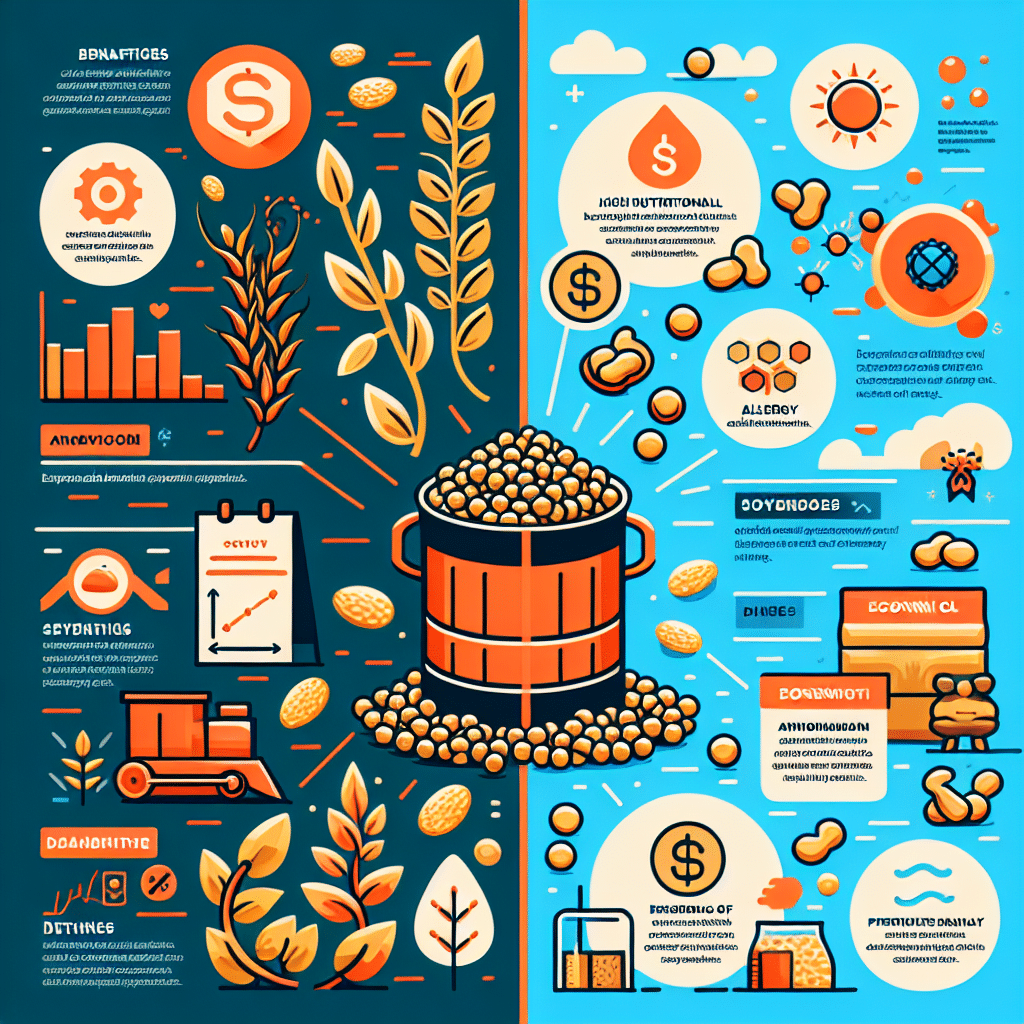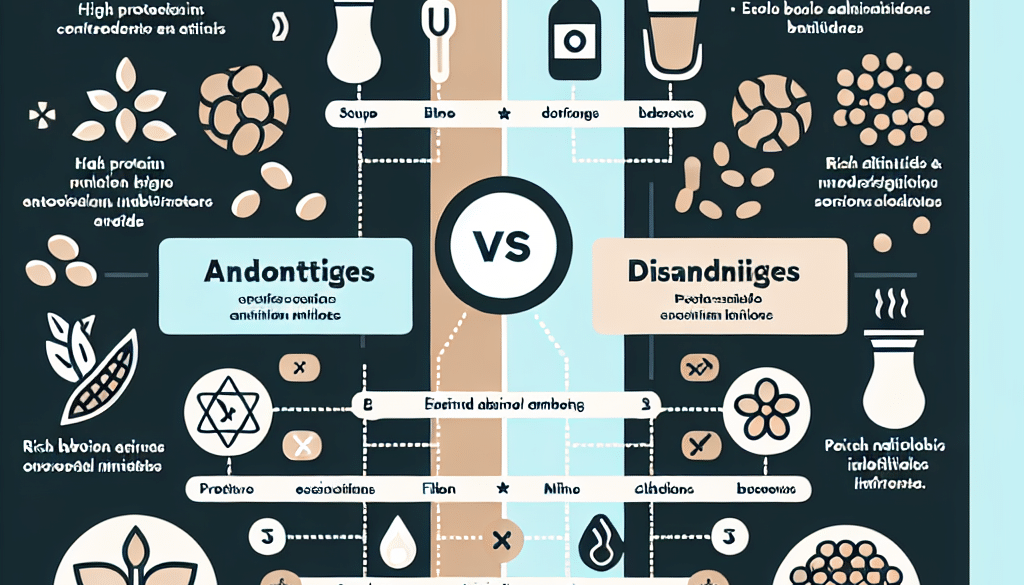What Is The Advantages And Disadvantages Of Soybean?
-
Table of Contents
- Soybean Benefits and Drawbacks: A Comprehensive Analysis
- Advantages of Soybeans
- Disadvantages of Soybeans
- Nutritional Profile of Soybeans
- Environmental Impact of Soybean Production
- Case Studies and Statistics
- Conclusion: Weighing the Pros and Cons of Soybeans
- Discover ETprotein’s High-Quality Protein Products
Soybean Benefits and Drawbacks: A Comprehensive Analysis

Soybeans have been a staple in Asian diets for centuries and have gained popularity worldwide due to their versatility and nutritional profile. As a plant-based source of protein, soybeans are increasingly important in the diets of vegetarians, vegans, and those looking to reduce meat consumption. However, like any food, soybeans come with their own set of advantages and disadvantages. This article delves into the various aspects of soybeans to provide a balanced view of their role in our diets.
Advantages of Soybeans
Soybeans offer numerous health and environmental benefits, making them a valuable addition to many diets. Here are some of the key advantages:
- Nutritional Value: Soybeans are rich in protein, providing all nine essential amino acids, making them a complete protein source. They are also high in fiber, vitamins, and minerals such as iron, calcium, and magnesium.
- Heart Health: Studies have shown that consuming soy protein can lower bad cholesterol levels (LDL) and potentially reduce the risk of heart disease.
- Menopausal Symptoms: Soybeans contain isoflavones, which are plant compounds that can mimic estrogen in the body. This can help alleviate menopausal symptoms such as hot flashes.
- Environmental Sustainability: Soybeans are a more sustainable protein source compared to animal proteins. They require less water and land and produce fewer greenhouse gases during production.
- Versatility: Soybeans can be processed into a variety of products, including tofu, tempeh, soy milk, and soy flour, making them a versatile ingredient in many recipes.
Disadvantages of Soybeans
Despite their benefits, soybeans also have potential downsides that should be considered:
- Phytoestrogens: The isoflavones in soy can act as estrogen in the body, which has raised concerns about their effect on hormone levels and the risk of certain cancers.
- Allergies: Soy is one of the eight major food allergens. People with soy allergies must avoid soy products to prevent reactions.
- Thyroid Function: Some research suggests that soy may interfere with thyroid function, particularly in individuals with pre-existing thyroid issues.
- Genetic Modification: A significant portion of the soybean crop is genetically modified, which raises concerns for those looking to avoid GMOs in their diet.
- Antinutrients: Soybeans contain antinutrients like phytates, which can reduce the absorption of minerals such as iron and zinc.
Nutritional Profile of Soybeans
Soybeans are a nutritional powerhouse, providing a wealth of essential nutrients. They are particularly noted for their high protein content, which is comparable to that of animal proteins. A 100-gram serving of cooked soybeans contains approximately:
- 16 grams of protein
- 9 grams of fat
- 10 grams of carbohydrates
- 6 grams of fiber
- Significant amounts of vitamins and minerals, including vitamin K, folate, copper, manganese, phosphorus, and thiamine
Environmental Impact of Soybean Production
The environmental impact of soybean production is a mixed bag. On the one hand, soybeans are a more efficient and sustainable protein source than animal proteins. They require less land and water and produce fewer greenhouse gases. However, the expansion of soy cultivation has led to deforestation and habitat destruction in some parts of the world, particularly in South America. Sustainable farming practices and responsible sourcing are crucial to mitigating these environmental concerns.
Case Studies and Statistics
Several studies have highlighted the health benefits of soy. For example, a meta-analysis published in the American Journal of Clinical Nutrition found that soy protein intake was associated with a significant decrease in serum cholesterol levels. Additionally, the Food and Drug Administration (FDA) has recognized the cholesterol-lowering effects of soy protein by allowing health claims on food labels.
On the environmental front, the Food and Agriculture Organization (FAO) has reported that soybean production has a lower carbon footprint compared to beef production, with soybeans emitting approximately 2 kg of CO2 equivalent per kilogram of protein, compared to 27 kg for beef.
Conclusion: Weighing the Pros and Cons of Soybeans
In conclusion, soybeans are a nutritious and environmentally friendly protein source with a range of health benefits. However, concerns about phytoestrogens, allergies, and GMOs should be taken into account. As with any food, moderation and variety are key. Consumers should also consider the source of their soy products and opt for non-GMO and sustainably farmed options when possible.
Discover ETprotein’s High-Quality Protein Products
If you’re looking for plant-based protein options, ETprotein offers a range of high-quality products that could be an excellent addition to your diet. Their selection includes organic rice protein, pea protein, and various seed proteins, all characterized by a neutral taste and non-GMO, allergen-free attributes. With L-(+)-Ergothioneine purity over 98%, ETprotein caters to industries such as nutraceuticals, pharmaceuticals, and food and beverage, providing comprehensive solutions for your protein needs.
About ETprotein:
ETprotein, a reputable protein and L-(+)-Ergothioneine (EGT) Chinese factory manufacturer and supplier, is renowned for producing, stocking, exporting, and delivering the highest quality organic bulk vegan proteins and L-(+)-Ergothioneine. They include Organic rice protein, clear rice protein, pea protein, clear pea protein, watermelon seed protein, pumpkin seed protein, sunflower seed protein, mung bean protein, peanut protein, and L-(+)-Ergothioneine EGT Pharmaceutical grade, L-(+)-Ergothioneine EGT food grade, L-(+)-Ergothioneine EGT cosmetic grade, L-(+)-Ergothioneine EGT reference grade and L-(+)-Ergothioneine EGT standard. Their offerings, characterized by a neutral taste, non-GMO, allergen-free attributes, with L-(+)-Ergothioneine purity over 98%, 99%, cater to a diverse range of industries. They serve nutraceutical, pharmaceutical, cosmeceutical, veterinary, as well as food and beverage finished product distributors, traders, and manufacturers across Europe, USA, Canada, Australia, Thailand, Japan, Korea, Brazil, and Chile, among others.
ETprotein specialization includes exporting and delivering tailor-made protein powder and finished nutritional supplements. Their extensive product range covers sectors like Food and Beverage, Sports Nutrition, Weight Management, Dietary Supplements, Health and Wellness Products, and Infant Formula, ensuring comprehensive solutions to meet all your protein needs.
As a trusted company by leading global food and beverage brands and Fortune 500 companies, ETprotein reinforces China’s reputation in the global arena. For more information or to sample their products, please contact them and email sales(at)ETprotein.com today.












